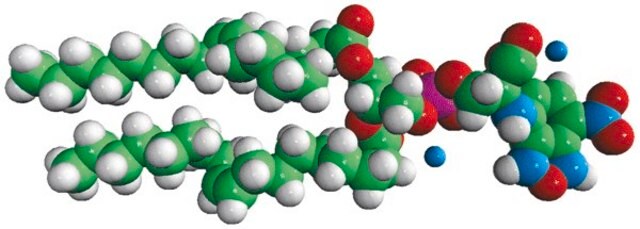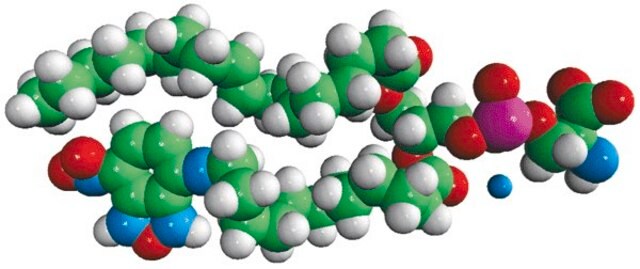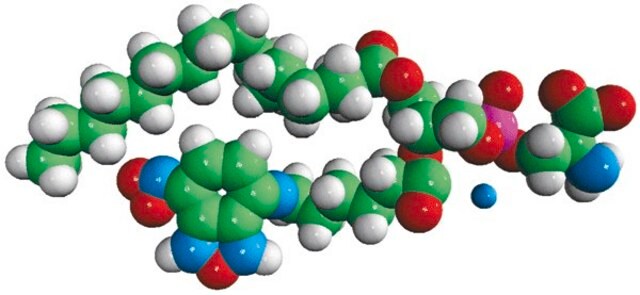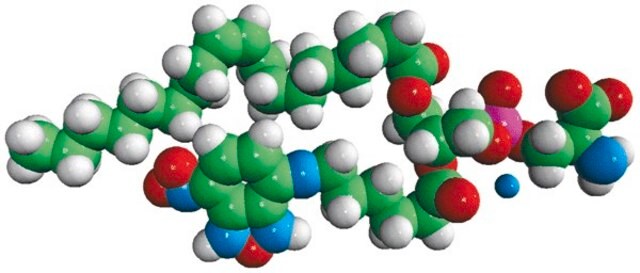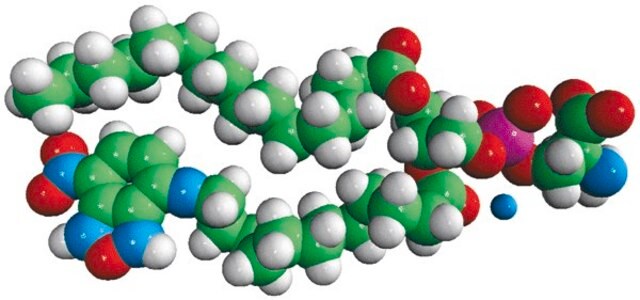810194P
Avanti
18:1-06:0 NBD PS
Avanti Research™ - A Croda Brand
Synonym(s):
1-oleoyl-2-{6-[(7-nitro-2-1,3-benzoxadiazol-4-yl)amino]hexanoyl}-sn-glycero-3-phosphoserine (ammonium salt)
Sign Into View Organizational & Contract Pricing
All Photos(2)
About This Item
Empirical Formula (Hill Notation):
C36H61N6O13P
CAS Number:
Molecular Weight:
816.88
MDL number:
UNSPSC Code:
12352211
NACRES:
NA.25
Recommended Products
Assay
>99% (TLC)
form
powder
packaging
pkg of 1 × 1 mg (810194P-1mg)
manufacturer/tradename
Avanti Research™ - A Croda Brand
shipped in
dry ice
storage temp.
−20°C
General description
Phosphatidylserine (PS) is an acidic phospholipid enriched in human cerebral cortex. It is abundant in the inner leaflet of the plasma membrane in neural tissues. NBD PS is a fluorescently labeled phospholipid with 7-nitrobenz-2-oxa-1,3-diazol-4-yl (NBD) at the headgroup of PS.
Application
18:1-06:0 NBD PS or 1-oleoyl-2-{6-[(7-nitro-2-1,3-benzoxadiazol-4-yl)amino]hexanoyl}-sn-glycero-3-phosphoserine (ammonium salt) may be used as a marker to determine the aminophospholipid transferase activity and in large unilammelar vesicles (LUVs) to investigate the role of phosphatidylinositol 4,5-bisphosphate (PIP2).
Biochem/physiol Actions
Phosphatidylserine (PS) is involved in the regulation of many enzymes and structural components. It supports neuronal survival, neurite growth and synaptogenesis. It is associated with cognitive disability in Alzheimer′s disease.
Packaging
5 mL Amber Glass Screw Cap Vial (810194P-1mg)
Legal Information
Avanti Research is a trademark of Avanti Polar Lipids, LLC
Storage Class Code
11 - Combustible Solids
Choose from one of the most recent versions:
Certificates of Analysis (COA)
Lot/Batch Number
Sorry, we don't have COAs for this product available online at this time.
If you need assistance, please contact Customer Support.
Already Own This Product?
Find documentation for the products that you have recently purchased in the Document Library.
Metabolism and functions of phosphatidylserine
Vance JE and Steenbergen R
Progress in Lipid Research null
The distribution and function of phosphatidylserine in cellular membranes
Leventis PA and Grinstein S
Annual Review of Biophysics null
R A Zager et al.
Kidney international, 55(1), 148-159 (1999-01-20)
Fluorinated anesthetics can profoundly alter plasma membrane structure and function, potentially impacting cell injury responses. Because major surgery often precipitates acute renal failure, this study assessed whether the most commonly used fluorinated anesthetic, isoflurane, alters tubular cell responses to toxic
Phosphatidylserine and the human brain
Glade MJ and Smith K
Nutrition null
Organization and dynamics of N-(7-nitrobenz-2-oxa-1, 3-diazol-4-yl)-labeled lipids: a fluorescence approach
Mukherjee S, et al.
Chemistry and Physics of Lipids null
Our team of scientists has experience in all areas of research including Life Science, Material Science, Chemical Synthesis, Chromatography, Analytical and many others.
Contact Technical Service